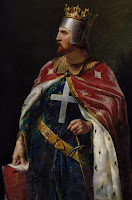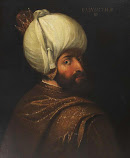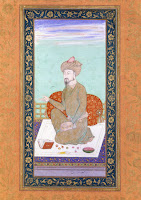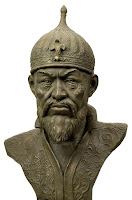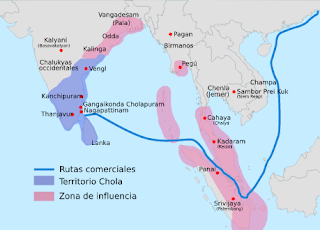In History, countless Great Warriors came but few emerged as one of the greatest of
all time. This is the complete list of Top 10 Greatest Warriors in History. Criteria
should be established based on (1) Warrior's level of Bravery, Valor, Determination
and Combat skills against enemies in battles (2) Trail of successes should also be checked by single combat between warriors during battles (3) and most importantly his distinguish as one of the greatest warriors should be judged either as an undefeated military commander or even as an undefeated warrior in
a series of hand-to-hand combat despite his prolonged military career of constant wars.
10. Hannibal Barca:
Hannibal Barca (247-183 CE), Carthaginian general and terror of the Romans. Despite his least resources and inexperienced troops, his personal level of bravery coupled with generalship, endure his troops to remain formidable in the face of Romans. His famous military feat had occurred, when he and his troops crossed the Alps while carrying his African war elephants into Italy through the notorious terrains. He was one of the first toughest opponents that Romans have faced.
9. Richard I the Lionheart:
Richard I (1157-1199 CE) was the king of England for almost 10 years. At the age of 16, he had taken command of his own army and putting down rebellion against his father. Later on, he joined the Third Crusader against the Saracens and defeated Ayyubid Sultan Saladin on two major Battles (Battle of Arsuf & Battle of Jaffa) and restores much of the Christian lands around the eastern Mediterranean, which endure for another century. He was the first-ever person who decisively gains victories over Muslims since the rise of Islam in the early 7th century. His courage, bravery, and generalship inspire many legends, even the famous Muslim chronicler Ibn al-Athir praises Richard's great personality by saying that "For courage, Shrewdness, energy, and patience, the king (Richard) was the outstanding man of his times" (Ibn al-Athir, p. 387). Currently, he is an enduring iconic figure both in England & in France.
8. Alexander the Great:
Alexander III of Macedon, famously known as Alexander the Great, king of the ancient Greek kingdom called Macedon. For 13 years of his ruling life, he conquered almost half of the known world of his time despite facing outnumbered enemies in battles and widely considered to be an undefeated military commander. He was an extremely brave warrior and front line commander in almost every battle. In his age of mid-twenties, he successfully fought against the lion and killed with his spear.
 7. Attila the Hun:
7. Attila the Hun:
Attila the Hun (406-453 CE) one of the most ruthless warriors of all time, invaded both eastern and western Europe numerous times and spread great terror. If Tamerlane (Taimur) is the Scourge of Asia then Attila is the Scourge of Europe. His rapid movement of horse archers and cavalry was a major part of the Hunnic strength and he defeated both eastern and western Roman Empire several times. He plunders and massacres the huge population in the conquered cities of Europe and left a tale of terror across the western world. Only death can stop his continuous barbarity.
Aurangzeb Alamgir (1618-1017 CE) was the last great king of the powerful Mughal Empire of India. He rose to prominence as a warrior at the age of 14, when he was fighting against the mad war elephant who stampeded through the Mughal Imperial encampment. He rode against the elephant and struck its trunk with a lance and successfully defended himself from being crushed. After that, he received the title Bahadur (Brave) from his father Mughal king Shah Jahan. He ruled almost the entire Indian Subcontinent for nearly half a century (1658-1707 CE) and his military career spanned 7 decades (1636-1707 CE), the longest in entire known military history. He was an accomplished administrator, military leader, and warrior, constantly engaged in wars despite his old age around ninety years. Nobody could be able to stand up against Aurangzeb Alamgir as long as he lived on, whether Marathas, Sikhs, Jats, Rajputs and Pashtuns from the inside or whether colonial British, Portuguese and Dutch from the outside and there is no question about foreign invaders like Nader Shah or Ahmed Shah. He ruled over a quarter of the world's population and its wealth.
4. Zahir-ud-din Muhammad:
Zahir-ud-din Muhammad (1483-1530 CE), famously known as Babur Badshah (Lion King) was the founder of the Mughal Empire in India and its first ruler. A descendant of Timur on his father's side and Genghis Khan on his mother's side, Babur was fearless in battle, excellent in horsemanship, and refine in archery. He was a physically very strong and tall man who could run on a rampart holding two men in his arms. He swam across several rivers in northern India such as Ganges and Yamuna Rivers. He could ride on a horse for eighty miles without any break. As a general, he was an extremely successful and brilliant commander. In numerous times, he defeated the outnumbered enemies in battles whether in Central Asia against the Uzbeks or whether in northern India against the Afghans and Rajputs. He spent 30 years of his life (out of 47 years) in exile with hardships. He is no doubt one of the toughest and bravest warriors in history.
3. Timur bin Taraghay Barlas:
Timur (1336-1405 CE) was one of the most fearsome and powerful warriors of all time. His constant involvement in a battlefield kept motivated his 100,000 troops. He is the only warrior who nearly reached the point of world domination in such a manner that has never been fully done by any other. Lame in his right leg and crippled in his right hand (injuries sustained from arrows) but in spite of all these facts, nobody could be able to stop him to become a ruler of an empire that eventually ruled over half of the known world. Timur simultaneously fighting with two swords (before his injuries) and use multiple weapons at the same time on a battlefield. In a close encounter, he even used both ax and a sword at the same time with two hands and a tie-down bow on the neck and if he sees the enemy is far away then he shows the brilliance of his archery. He is generally frontline commander on almost every battlefield and he was not wearing an armored suit at the old age. Sometimes he personally attacks hard on a center column of an enemy or sometimes he bait the enemies into a trap by ambush or sometimes he comes from the flank or rear side of the enemy to give them a surprise attack. This undefeated warrior and military commander died in 1405 before permanently settling his affairs with the Chinese once it for all.
10. Hannibal Barca:
Hannibal Barca (247-183 CE), Carthaginian general and terror of the Romans. Despite his least resources and inexperienced troops, his personal level of bravery coupled with generalship, endure his troops to remain formidable in the face of Romans. His famous military feat had occurred, when he and his troops crossed the Alps while carrying his African war elephants into Italy through the notorious terrains. He was one of the first toughest opponents that Romans have faced.
9. Richard I the Lionheart:
Richard I (1157-1199 CE) was the king of England for almost 10 years. At the age of 16, he had taken command of his own army and putting down rebellion against his father. Later on, he joined the Third Crusader against the Saracens and defeated Ayyubid Sultan Saladin on two major Battles (Battle of Arsuf & Battle of Jaffa) and restores much of the Christian lands around the eastern Mediterranean, which endure for another century. He was the first-ever person who decisively gains victories over Muslims since the rise of Islam in the early 7th century. His courage, bravery, and generalship inspire many legends, even the famous Muslim chronicler Ibn al-Athir praises Richard's great personality by saying that "For courage, Shrewdness, energy, and patience, the king (Richard) was the outstanding man of his times" (Ibn al-Athir, p. 387). Currently, he is an enduring iconic figure both in England & in France.
8. Alexander the Great:
Alexander III of Macedon, famously known as Alexander the Great, king of the ancient Greek kingdom called Macedon. For 13 years of his ruling life, he conquered almost half of the known world of his time despite facing outnumbered enemies in battles and widely considered to be an undefeated military commander. He was an extremely brave warrior and front line commander in almost every battle. In his age of mid-twenties, he successfully fought against the lion and killed with his spear.
 7. Attila the Hun:
7. Attila the Hun:Attila the Hun (406-453 CE) one of the most ruthless warriors of all time, invaded both eastern and western Europe numerous times and spread great terror. If Tamerlane (Taimur) is the Scourge of Asia then Attila is the Scourge of Europe. His rapid movement of horse archers and cavalry was a major part of the Hunnic strength and he defeated both eastern and western Roman Empire several times. He plunders and massacres the huge population in the conquered cities of Europe and left a tale of terror across the western world. Only death can stop his continuous barbarity.
6. Bayezid Yildirim:
Bayezid Yildirim "Thunderbolt" was the fourth Ottoman sultan and real founder of the Ottoman Empire who for the first time ever consolidated and centralized the Ottoman administration and leads towards an unprecedented scale of Ottoman territorial expansion. Bayezid ascended to the throne during the Battle of Kosovo (1389 CE) when his father was assassinated by the Serbians. In this turbulent time period and lack of military leadership, Bayezid took the command of his army, defeated the Serbians and conquered their empire, ending their sovereignty (Serbian King Lazar also died in this battle). A highly intrepid and skillful warrior, Bayezid earns the title Yaldrim "Thunderbolt" because of his rapid maneuverability on the battlefield against any foe. From 1390 to 1395, he launches military campaigns both in the east (against Anatolian Beyliks) and in the west (against Bulgaria, Greece, and Romania) in which he successfully conquered the Turkish Beyliks of Aydin, Saruhan, and Menteshe in Anatolia and Bulgarian Empire and northern Greece in the west, although campaigns against Romania were not quite successful. As a result of his rapid conquest and besieged of Constantinople (reducing the Byzantine Empire to its capital), the pope organized a Crusade against the Turks in 1396 (almost every major western European countries participated in this battle). With an enormous European army of Crusaders, under the command of Sigismund, king of Hungary and Croatia arrived at the plains of Nicopolis, northern Bulgaria. Bayezid Yaldrim decisively defeated the Crusaders army and reaching as far as the borders of Vienna in central Europe (It was widely regarded by many historians as the last large scale military Crusade against Muslims). He even made the Byzantine Empire brink of his collapse, only relieved from this total collapse, when Tartar warlord Timur invaded the domains of the Ottoman Empire, culminated in the Battle of Ankara (1402). Bayazid's valor and combat skills were exceptional, despite Timur's successful military strategy of diverting the water channel of Cubuk plains of Ankara to starve the Ottoman army from water and creating the desertions among Ottoman troops in the form of black Tartars who joined the Timurid forces in the midst of battle, Bayezid and his Soldiers were still capable enough to give him (Timur) the toughest battle of his life (along with the Battle of Terek River). Both thirsty and tired, Bayezid took few hundred horsemen to the nearby mountains and fight them till sunset while the Timurid army already surrounded the mountains from all four corners. Heavily outnumbered Timurid forces finally captured him. When Bayezid came in front of Timur with pride (not having any remorse fear); Timur smiled while seeing him. In response to this act Bayezid angrily replied to him by saying that "It doesn't fair to smile on those people whose conditions have wrecked by God (Allah)", Timur (while replying) said, "I smiled not because of it that I defeated you in battle, I smiled because of it that what kind of wisdom lies in this matter by God (Allah) that He gave the ownership of this world to such a lame like me (Timur) and such a one-eyed blind like you (Bayezid)" (Tamerlane the Earth Shaker by Harold Lamb). Imagine his own worthiness is even accepted by the greatest conqueror and military campaigner, Timur the Great; who admired him as the most worthy opponent while he was personally fought more than 40 years of his constant wars and defeated the armies of more than half of the known world without losing any of his single pitched battles and in the process also conquered more than one-third of the entire known earth.
5. Aurangzeb Alamgir:Bayezid Yildirim "Thunderbolt" was the fourth Ottoman sultan and real founder of the Ottoman Empire who for the first time ever consolidated and centralized the Ottoman administration and leads towards an unprecedented scale of Ottoman territorial expansion. Bayezid ascended to the throne during the Battle of Kosovo (1389 CE) when his father was assassinated by the Serbians. In this turbulent time period and lack of military leadership, Bayezid took the command of his army, defeated the Serbians and conquered their empire, ending their sovereignty (Serbian King Lazar also died in this battle). A highly intrepid and skillful warrior, Bayezid earns the title Yaldrim "Thunderbolt" because of his rapid maneuverability on the battlefield against any foe. From 1390 to 1395, he launches military campaigns both in the east (against Anatolian Beyliks) and in the west (against Bulgaria, Greece, and Romania) in which he successfully conquered the Turkish Beyliks of Aydin, Saruhan, and Menteshe in Anatolia and Bulgarian Empire and northern Greece in the west, although campaigns against Romania were not quite successful. As a result of his rapid conquest and besieged of Constantinople (reducing the Byzantine Empire to its capital), the pope organized a Crusade against the Turks in 1396 (almost every major western European countries participated in this battle). With an enormous European army of Crusaders, under the command of Sigismund, king of Hungary and Croatia arrived at the plains of Nicopolis, northern Bulgaria. Bayezid Yaldrim decisively defeated the Crusaders army and reaching as far as the borders of Vienna in central Europe (It was widely regarded by many historians as the last large scale military Crusade against Muslims). He even made the Byzantine Empire brink of his collapse, only relieved from this total collapse, when Tartar warlord Timur invaded the domains of the Ottoman Empire, culminated in the Battle of Ankara (1402). Bayazid's valor and combat skills were exceptional, despite Timur's successful military strategy of diverting the water channel of Cubuk plains of Ankara to starve the Ottoman army from water and creating the desertions among Ottoman troops in the form of black Tartars who joined the Timurid forces in the midst of battle, Bayezid and his Soldiers were still capable enough to give him (Timur) the toughest battle of his life (along with the Battle of Terek River). Both thirsty and tired, Bayezid took few hundred horsemen to the nearby mountains and fight them till sunset while the Timurid army already surrounded the mountains from all four corners. Heavily outnumbered Timurid forces finally captured him. When Bayezid came in front of Timur with pride (not having any remorse fear); Timur smiled while seeing him. In response to this act Bayezid angrily replied to him by saying that "It doesn't fair to smile on those people whose conditions have wrecked by God (Allah)", Timur (while replying) said, "I smiled not because of it that I defeated you in battle, I smiled because of it that what kind of wisdom lies in this matter by God (Allah) that He gave the ownership of this world to such a lame like me (Timur) and such a one-eyed blind like you (Bayezid)" (Tamerlane the Earth Shaker by Harold Lamb). Imagine his own worthiness is even accepted by the greatest conqueror and military campaigner, Timur the Great; who admired him as the most worthy opponent while he was personally fought more than 40 years of his constant wars and defeated the armies of more than half of the known world without losing any of his single pitched battles and in the process also conquered more than one-third of the entire known earth.
Aurangzeb Alamgir (1618-1017 CE) was the last great king of the powerful Mughal Empire of India. He rose to prominence as a warrior at the age of 14, when he was fighting against the mad war elephant who stampeded through the Mughal Imperial encampment. He rode against the elephant and struck its trunk with a lance and successfully defended himself from being crushed. After that, he received the title Bahadur (Brave) from his father Mughal king Shah Jahan. He ruled almost the entire Indian Subcontinent for nearly half a century (1658-1707 CE) and his military career spanned 7 decades (1636-1707 CE), the longest in entire known military history. He was an accomplished administrator, military leader, and warrior, constantly engaged in wars despite his old age around ninety years. Nobody could be able to stand up against Aurangzeb Alamgir as long as he lived on, whether Marathas, Sikhs, Jats, Rajputs and Pashtuns from the inside or whether colonial British, Portuguese and Dutch from the outside and there is no question about foreign invaders like Nader Shah or Ahmed Shah. He ruled over a quarter of the world's population and its wealth.
4. Zahir-ud-din Muhammad:
Zahir-ud-din Muhammad (1483-1530 CE), famously known as Babur Badshah (Lion King) was the founder of the Mughal Empire in India and its first ruler. A descendant of Timur on his father's side and Genghis Khan on his mother's side, Babur was fearless in battle, excellent in horsemanship, and refine in archery. He was a physically very strong and tall man who could run on a rampart holding two men in his arms. He swam across several rivers in northern India such as Ganges and Yamuna Rivers. He could ride on a horse for eighty miles without any break. As a general, he was an extremely successful and brilliant commander. In numerous times, he defeated the outnumbered enemies in battles whether in Central Asia against the Uzbeks or whether in northern India against the Afghans and Rajputs. He spent 30 years of his life (out of 47 years) in exile with hardships. He is no doubt one of the toughest and bravest warriors in history.
3. Timur bin Taraghay Barlas:
Timur (1336-1405 CE) was one of the most fearsome and powerful warriors of all time. His constant involvement in a battlefield kept motivated his 100,000 troops. He is the only warrior who nearly reached the point of world domination in such a manner that has never been fully done by any other. Lame in his right leg and crippled in his right hand (injuries sustained from arrows) but in spite of all these facts, nobody could be able to stop him to become a ruler of an empire that eventually ruled over half of the known world. Timur simultaneously fighting with two swords (before his injuries) and use multiple weapons at the same time on a battlefield. In a close encounter, he even used both ax and a sword at the same time with two hands and a tie-down bow on the neck and if he sees the enemy is far away then he shows the brilliance of his archery. He is generally frontline commander on almost every battlefield and he was not wearing an armored suit at the old age. Sometimes he personally attacks hard on a center column of an enemy or sometimes he bait the enemies into a trap by ambush or sometimes he comes from the flank or rear side of the enemy to give them a surprise attack. This undefeated warrior and military commander died in 1405 before permanently settling his affairs with the Chinese once it for all.
2. Khalid bin al-Waleed:
Khalid bin al-Waleed (592-642 CE) also known as Sayf Allah al-Maslul (the Drawn Sword of God), was a companion of the Islamic prophet Muhammad (صلى الله عليه و سلم). Under his military leadership Arabia for the first time united. He remained undefeated in more than 100 battles against numerically superior forces of Byzantine Roman Empire and Sassanian Persian Empire, even in Ridda Wars against Arab tribes in the Arabian Peninsula as well as in numerous single duels against the best warriors of the Arabs (in Arabian Peninsula), Persians (in the Mesopotamia) and Romans (in the Levant). Khalid was the inventor of most of the early Muslim military dogmas, he was a precursor to almost every main tactic that Muslims used during early Islamic conquest. One of Khalid's major accomplishments in this context was using the individual skills of Arab Bedouin warriors to a larger scale. He is considered to have created them into an almost regular unit called Mubarizun (Champions), who would issue personal challenges to the enemy officers. These were extremely qualified and proficient swordsmen, whom Khalid used effectively to slay as many enemy officers as feasible, giving a psychological blow to enemy self-confidence.
Khalid bin al-Waleed (592-642 CE) also known as Sayf Allah al-Maslul (the Drawn Sword of God), was a companion of the Islamic prophet Muhammad (صلى الله عليه و سلم). Under his military leadership Arabia for the first time united. He remained undefeated in more than 100 battles against numerically superior forces of Byzantine Roman Empire and Sassanian Persian Empire, even in Ridda Wars against Arab tribes in the Arabian Peninsula as well as in numerous single duels against the best warriors of the Arabs (in Arabian Peninsula), Persians (in the Mesopotamia) and Romans (in the Levant). Khalid was the inventor of most of the early Muslim military dogmas, he was a precursor to almost every main tactic that Muslims used during early Islamic conquest. One of Khalid's major accomplishments in this context was using the individual skills of Arab Bedouin warriors to a larger scale. He is considered to have created them into an almost regular unit called Mubarizun (Champions), who would issue personal challenges to the enemy officers. These were extremely qualified and proficient swordsmen, whom Khalid used effectively to slay as many enemy officers as feasible, giving a psychological blow to enemy self-confidence.
Ali bin Abi Talib
(601-661 CE) was the cousin and son-in-law of the Islamic prophet Muhammad (صلى الله عليه و سلم). He was also the second last Rashidun Caliph (656-661 CE). Ali remained undefeated in both series of single combat as well as military commander (except the Battles of Uhad and Saffin, which ended in stalemate). He distinguished himself as a warrior during the first battle of the Islamic world (Battle of Badr). He killed one of Mecca's fiercest warriors Walid bin Utba (an Umayyad champion) during single combat and also killed in between 20 to 35 Meccan soldiers out of 70 during the Battle of Badr. During the battle of Uhad, despite he was seriously wounded 16 times, he killed 8 standard bearers alone, won hand-to-hand combat against Talhah ibn Abu Talha, show unmatched valor and art of skills during the time of Muslim's turmoil, fear, and flight from the battlefield. As per Sir John Glubb in his book The Great Arab Conquest (1963) "Ali ibn Abu Talib pressed on undismayed into the enemy ranks – it was Badr again; the Muslims were invincible". He proved again by killing one of the most fearsome warriors of the Meccans, Amr ibn wod al ameree during combat (who was thought to be equivalent to 1000 men). As a commander and warrior, his greatest victory would occur in the Battle of Khayber in which he conquered the richest and powerful castle of the Jews and killed his most formidable commander Marhab during the duel. He participated in every battle of the Prophet Muhammad (except the Battle of Tabuk) as a standard-bearer or commander of the Muslim army. After Muhammad, Ali bin Abi Talib stayed in Medina for almost 25 years (during the Rashidun period of the first three Caliphs). His military career resumed after his appointment as a fourth Rashidun (Rightly Guided) Caliph and he fought three major pitched battles. In spite of his old age (mid-fifties), he displays unprecedented bravery like a thunderbolt on the battlefield. His bloodiest battle occurred in the Battle of Siffin in which he fought tirelessly for three days and inflict heavy casualties on enemy fronts. Due to the enormous loss of Muslim lives, Ali offered a duel to Mauwiya but he declines to put up a fight against him. In Gibbon's words, "Ali generously proposed to save the blood of the Muslims by single combat; but his trembling rival declined the challenge as a sentence of inevitable death". Muhammad gave him the title of Asadullāh (Lion of Allah) and acknowledged him as the Greatest Warrior of all time.

